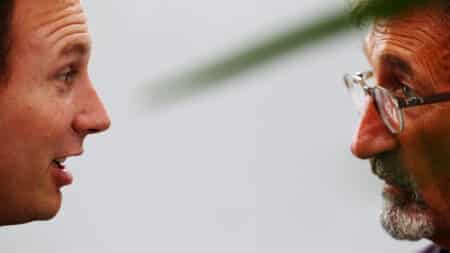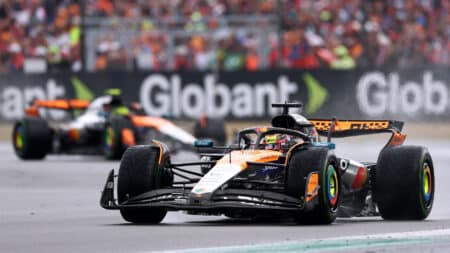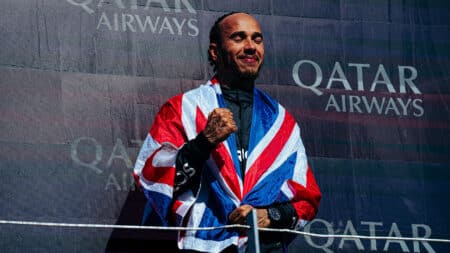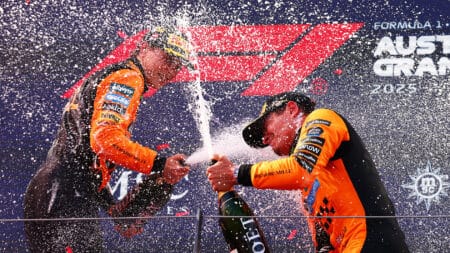
Horner's departure shows age of the maverick F1 boss is over
Christian Horner has now left Red Bull, the last of a certain breed of F1 team principal
It all began with a telephone call from his son.
“Hey Dad, one of our drivers has pulled out, how about you come and drive with us? We’re testing next week, why don’t you come along?” said Justin Bell who was due to race a Riley-Pontiac for RVO Motorsports in the Daytona 24 Hours in January. His Father did not immediately accept the invitation.

“Well, it was tempting of course,” says Derek, “ but I’d been back home to England for Christmas, I’d had quite a lot to eat and drink and, although I’ve always kept in shape, I wasn’t sure about going to Daytona at the age of sixty-six in a car I’d never driven. Anyway, Justin persuaded me to go along to a test at the start of January and I first drove the thing at night which wasn’t exactly ideal.”

The initial test wasn’t all plain sailing, even for a man who has won eight twenty-four races, three of them at the Daytona speedway.
“Yes, I was a bit jet-lagged, I’d only just got back to Florida. And it was at night, it was cold, and I couldn’t get used to the sequential gearshift to begin with. I had problems changing down the gears with the paddle system, I was driving like an old woman, and I felt a bit depressed. The last time I’d used that kind of semi-automatic shift was in the Ferrari 333SP and that was about five years ago, so I was a bit all over the place. But the guys talked me through it and after a couple of days I was pretty much on the pace. I was loving the whole thing about being back in a competitive car, and being part of the whole scene again. The car is quick, you know, it’s got nearly 600 bhp and it’s quite tail-happy which keeps you on the ball. It was quite emotional and I was a bit mixed up in my own mind about what to do. So I had a chat with my wife Mistie,” he smiles, “and she said, ‘look honey, if you want to do it, do it,’ which was great, and typical of her. Then a few days later she said, ‘hey, sweetheart, do you really need to do this? It makes me a little nervous,’ and my young son Sebastian said, ‘ yeah, and it makes me feel nervous too Dad’. I understood that, with his big brother and his Father in the race, but I’d made up my mind to do one last big twenty-four hours. If it was back in the days when people were getting killed all the time, then I would almost certainly have stayed away.”
By this stage Derek had just three weeks to prepare for the race. He went to the gym, worked out a bit, got a new helmet and some new overalls, and started to get back into the routine.

“Don’t forget,” says Derek, “ I did race in 2007, I drove the Porsche 962 at Brian Redman’s event at Daytona and I beat Emerson Fittipaldi in a Toyota celebrity race, that was good. I always try to do the Goodwood Revival, too, after all it’s where I won my first ever race in a Lotus 7 in 1964 and it’s a wonderful circuit with some great memories. Then I drove the Bentley Le Mans car at Sears Point at the end of the year, and that was pretty physical, so I knew I was in good shape. In fact the doctors said I was absolutely fine, all the vital functions up to speed, you know. I mean, if I’d been out for a year or something then I probably would have said no to Justin for Daytona.”
There were to be five drivers in the RVO Riley-Pontiac – the Bells plus team owner Roger Schramm, a young Estonian called Tonis Kasemets, and Paul Dallenbach from the famous American dynasty of racing Dallenbachs.

“It sounds like a big crew,” says Derek, “ but Roger was only going to do some laps towards the end while all the younger guys would be doing double stints and I was really looking forward to one last twenty-four race, one last hurrah. We rented a big fifty-foot camper and set up home at the circuit, the families came down for the race weekend, and I felt pretty relaxed about it all, very calm about the whole thing. It’s hard, you know, to give it all up after forty-four years in a racing car.”
So, raceday came, and went. Just like that. And Derek never even got behind the wheel.
“Maybe it wasn’t meant to be, or something,” he laughs, “but I feel cheated and today, sitting at home, I do feel very disappointed, yes. I wanted to finish with one last big race, especially at Daytona, where I’ve won three times, but I’ve been here before and it was nobody’s fault.”
There was relief, however, that Justin had survived what could have been a very nasty accident and which resulted in the car being packed away.
“We were running well,” explains Derek, “I’d told everybody to keep out of trouble, stay out of the way, and only come in if you have to, just keep it going. We were up in ninth place and Justin was flashing down the back straight at over 180 mph when he felt a vibration. Before he could get it slowed, bang, a front disc exploded and bits of it came through the floor and went whizzing past his ear, it was pretty shattering. He arrived backwards into the chicane but gathered it all up and managed to pull off the circuit and get a tow back to the pits. The damage was just too bad to continue – the wheel and the disc had torn the front suspension out of the chassis and the floor was nearly worn through to the fuel tank – so it was just as well we had to stop. Disappointing, such a shame not to have even had a go.”
So, no more Le Mans, and now no more Daytona. But lots of great memories in the bag.

“God, yes, absolutely,” Derek grins, “I mean, now we live here in Boca Raton in Florida, the place is only a couple of hours down the highway and it’s a fantastic racetrack. It is now the mega place for racing in the States, great facilities, especially since the money came in from the NASCAR races. And the fans are fantastic, they love it, and they come and talk to you, know exactly who you are and what you’ve done. For me, Le Mans will always be number one, but Daytona is very special and the twenty-four hours there is a tough race to win. It’s very different, of course, from Le Mans – in many ways. At La Sarthe you’re on an eight-mile lap with fifty-five cars whereas at Daytona you’re on a lap of less than three miles with up to seventy cars. So the traffic is much harder work, twice as stressful, and it’s much more physical. You can pass on the Mulsanne at Le Mans, at least you could before they bastardised it with those two chicanes, and there’s more of a flow to the place. Before those silly new chicanes you could relax on the Mulsanne too, move your shoulders around, flex your wrists and relax some of the cramps in the muscles. At Daytona it’s all point and squirt, with lots of second gear corners, 90 mph corners, but second gear all the same. There are slower cars everywhere, so you can get badly held up on the infield – but then you can overtake on the banking. Both places call for tremendous discipline and stamina but I think Daytona is more challenging in some ways. All these 24-hour races are extremely demanding, whether it’s Le Mans or Daytona. I remember in 1987, at Daytona, I was sharing a Porsche 962 with Al Unser and Chip Robinson and one of the side windows had been sucked out, so the ventilation system was ruined and it was getting pretty uncomfortable. Al was sick, I had the cramps and Chip was totally knackered so we brought in Al Holbert, who’d been working as crew chief, and he took over for an hour and a half. In the end A.J Foyt, who’d been chasing us, blew his engine up and we had quite an easy victory. I really thought I wouldn’t be able to do the final stint that year. The masseur put me on a bed of ice and I had such bad cramps I couldn’t get back into my overalls for those last few laps, but then the guys told me I’m on in fifteen minutes, the adrenalin kicked in and somehow you jump back in and you’re racing again. Of course it does help if you are leading the race and you’re about an hour away from victory. In the days when the cars had loads of grip, you were really knackered, especially when it was just the two of you sharing a car like the Porsche 917 at Le Mans – you can do that race with two drivers – but it’s not an option at the speedway, three is essential.”
The scene of three victories, then, in 1986,’87 and ’89, but also the scene of an extremely close encounter with concrete, an encounter of the kind that was surely responsible for a few crags on the famous craggy features of the Le Mans legend.

“God, yes, I am the luckiest bastard alive,” he laughs now, but not at the time, “that was in 1990, we were running just outside the top three in the Porsche 962. It was during the night when the left rear tyre let go on the banking between turns three and four. I tell you, tyre failure on the banking at Daytona is something you can really do without. The car went straight into the wall and took off into the night. I always used to run high on the banking, close to the wall, just in case something like that happened. Anyway, the front end went up in the air and that was it – we just flew upside down for a very long way. There were guys racing underneath me while I was flying…….. then it landed on its tail on the concrete apron by the pits. It seemed to slide for ever on its roof, my helmet was wearing through on the concrete, then it stopped. I could hear liquid trickling around somewhere, and I could smell petrol, so I released the belts and banged the fire extinguisher button quick as I could. The problem then was that the gas extinguisher sucked all the air out of the cockpit – and all the air out of me too – so I passed out. Boy, I tell you, I was lucky that time. But I have great memories of the speedway at Daytona and I just wish I could have started that one last race at the place.”
So, that’s it then, is it? Has Derek Bell finally retired? Again.
“ Well, um, yes, but…………well, look, for now it’s over, yes. But I’ve thought it was all over before. I’ve never, you know, officially retired because it’s just so hard to do. I always said that I would never do Le Mans again and there’s a thousand youngsters out there wanting to have a go, prepared to pay for a drive. I have never, and will never, race for nothing. Who knows, if I get another offer I can’t refuse……………..you forget how much you love it until you get back in the car.”
To translate that response, Derek Bell will definitely probably retire. Maybe. Remember, he first started talking about retirement at the end of 1988, the year before he took his third victory at Daytona. At the time he said he hoped he would be able to stop sensibly, not make a “bloody idiot” of himself, not become some old fogey in a blazer.

So far, so good, then.

Christian Horner has now left Red Bull, the last of a certain breed of F1 team principal

Was Oscar Piastri the real winner in the long run after Silverstone? asks James Elson

Lewis Hamilton hadn't won in almost three years – and then produced a sensational victory at Silverstone 2024. James Elson explains why it was his best ever

Describing this year's championship race as a 'battle' might be slightly over-egging it, writes James Elson